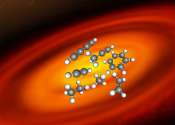Complex organic molecules discovered in infant star system
For the first time, astronomers have detected the presence of complex organic molecules, the building blocks of life, in a protoplanetary disk surrounding a young star, suggesting once again that the conditions that spawned ...









